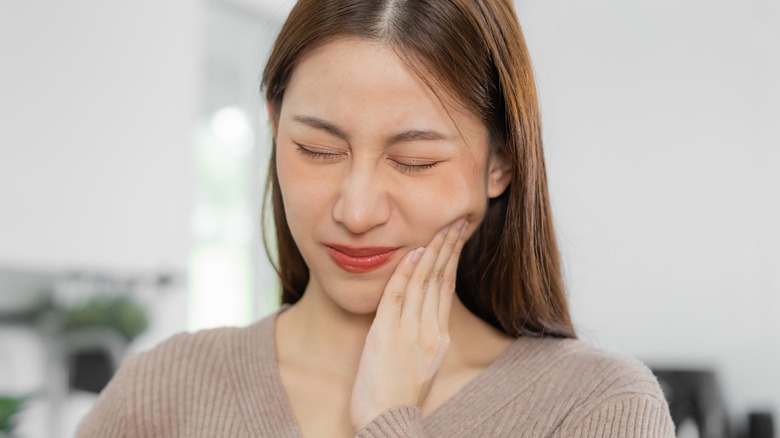The Side Effects Of Losing Your Taste
Thanks to over 10,000 sensory organs in our tongues, known as taste buds (via Nemours KidsHealth), we can easily experience the sweetness of a freshly baked chocolate chip cookie or the salt from a bag of potato chips. Unfortunately, according to the Cleveland Clinic, this is not the case for patients suffering from ageusia, the complete loss of sense of taste, which makes it a challenge to enjoy the different flavors in a dish. You may have temporarily experienced this if you've ever been sick with a cold or had COVID-19 and been unable to taste your food (per Keck Medicine of USC). Luckily, the total loss of taste is generally rare, occurring in only one to two out of a 1,000 patients, and is often triggered by an underlying illness or medical condition (via WebMD).
When our sense of taste is impacted, many less-than-desirable symptoms follow. This is because our taste is connected to a variety of organs, such as the nose, tongue, and throat, which can trigger a whole host of complications (via Medical News Today). If you're experiencing ageusia, you may also be facing side effects like reduced appetite, weight loss, and nutritional deficiency (via the Cleveland Clinic). This is why it is vital that you talk to your doctor to seek proper treatment if loss of taste persists.
Loss of appetite
Let's face it, being unable to taste your food can make eating seem like a hard task. According to Ageusia, this is true for patients who completely lose taste function in their tongues and, as a result, also their appetite. A great example of this can be found in COVID-19 patients, according to findings published in The Journal of Nutrition, who experienced a decreased desire to eat due to a temporary loss of smell and taste. This is likely due to the fact that loss of taste has a big physical effect on your body and therefore can affect your ability to feel hunger (via Cleveland Clinic).
While it can prove to be rather difficult to eat with weakened taste buds, GoodRx Health stresses the importance of following a well-balanced diet to give your body the food it needs to feel nourished. If you are suffering from ageusia and find it a challenge to eat, try eating small scheduled meals to make the act consistent but less overwhelming, according to The Life Raft Group. If your other senses like smell and sight are still intact, try appealing to them by making your foods look and smell attractive so that you are more inclined to eat (via BetterMe).
Unintended weight fluctuations
If you develop a taste disorder, you may also find your weight shifting on the scale. According to research findings published in the Acta Biomedica Journal, approximately 5% of the population suffers from reduced taste sensations, which have been linked to unintentional body weight changes, including both weight loss and weight gain. Another study on the eating habits and body weight changes of COVID-19 patients suffering from smell and taste loss confirmed these findings: This study, published in the journal Nutrients, explained that a distortion of taste and smell causes some individuals to have a reduced appetite that can induce a fullness sensation and lead to weight loss. In fact, eradicating flavor and taste from meals has proven to be an effective weight loss strategy for many (via Journal of Women's Health). However, it is crucial to note that in extreme ageusia cases, there is a greater risk for eating disorders like anorexia to develop (per Goldman-Cecil Medicine).
Weight gain can also occur as a side effect of ageusia. You may be wondering how this is possible if your appetite is reduced and your taste buds are nonfunctional. However, the study in Nutrients shows that flavor loss and altered taste buds can cause some people to actually increase their food intake, which can result in weight gain, though it is rarer than weight loss.
Nutrient deficiencies
While it's easy to take our sense of taste for granted, a loss of it may jeopardize our health and wellbeing. This is mainly due to the fact that the foods we select to consume are primarily dictated by factors like taste and smell, according to a study published in the World Journal of Otorhinolaryngology- Head & Neck Surgery. When our taste is altered, it is easy to add too much salt or sugar to our food (per Mayo Clinic) and, in general, gravitate toward unhealthy foods that seem more appealing.
Our bodies thrive on nutrient-rich foods such as fruits, vegetables, and whole grains that contain essential vitamins and minerals (via the American Heart Association). However, taste disorders like ageusia have been linked to poor nutrition and a diet lacking in zinc and vitamin B12 (per the Cleveland Clinic). These two micronutrients are essential for a well-functioning nervous system, according to the Performance Lab. Luckily, nutrient deficiencies can be easily combated by taking necessary supplements and consulting with a dietitian to follow a balanced diet suited to meet your body's unique needs, according to Nutrium.
Inability to taste that food is spoiled
You know that milk in your fridge that you can tell is expired just from the first sip? Unfortunately, for people that suffer from a loss of taste, relying on your taste buds to detect that a food item is spoiled is simply out of the question.
The gustatory system, which is responsible for the chemical sense of taste (via Dana Foundation), includes millions of receptors in our tongues that help us sense different flavors. This is important because when your receptors sense the taste of a spoiled or harmful item, you react appropriately by spitting it out rather than swallowing it. With ageusia comes the added danger of being unable to taste spoiled or expired substances, and therefore possibly ingesting them (per Johns Hopkins Medicine).
According to the National Institute of Deafness and Other Communication Disorders, having ageusia can make it especially difficult to tell the difference between salty, spicy, bitter, sweet, or sour food. It's important to note that for some people, taste disorders can also alter the taste of specific substances and make normal items taste unpleasant (per Cedars Sinai). While tasting an item can be a tell-tale sign to sense if it's spoiled, it is possible to still be safe by checking labels for expiration dates, examining your food visually for warning signs of spoilage (such as mold, or changes in color or texture), and tossing away anything that is past its shelf life (according to Consumer Reports).
Oral health issues
Your mouth acts as a passageway for food to enter your body. So, when you are unable to taste food, it makes sense that issues might arise with your teeth, gums, tongue, or overall oral health, as Netmeds.com explains. For instance, turning to excess sugar or salt after losing your taste can cause dental issues (via Pinefield Dental), upon which it's imperative to pay a visit to the dentist. Ramping up your oral care and hygiene habits is also extremely important when you're suffering from a loss of taste, according to the Cleveland Clinic.
Other times, poor oral health can occur simultaneously with or lead to taste loss. According to research published in PLOS One, taste loss is especially common among elderly patients who have decayed teeth, high growth of oral bacteria, and overall poor oral health. This research also shows that high oral bacteria can make it hard for these patients to detect sour items, while a dry mouth can impair perception of both sweet and salty tastes. This makes it easier for a poor diet to occur, which over time has been associated with oral health problems in later life, according to a study published in the British Journal of Nutrition.
Depression
According to the American Psychological Association, there is growing research regarding the potential connection between nutrition and mental health. This explains why if you are unable to taste food or lose your sense of taste, your mental health and quality of life could be impacted (via DynaMed). In fact, a symptom of severe cases of ageusia is depression. According to research findings published in the American Journal of Otolaryngology, over 43% of respondents suffering from taste and smell disturbances due to COVID-19 self-reported having depression as a result. This may be because sensory deficits like ageusia make individuals feel alone in their inability to taste or smell (per Talkspace). They may also feel as if they are missing out on key experiences and sensations — such as enjoying the familiar taste of a family recipe — that contribute to happiness.
Research published in the Journal of Affective Disorders Reports on patients suffering from a loss of smell and taste as a result of COVID-19 showed an increased risk of depression in the days following their positive diagnosis. Another study from the Laryngoscope Investigative Otolaryngology journal found a significant association between alterations in taste or smell and depression, especially in older adults. The study suggests that primary care doctors screen for depression if patients report changes in taste loss or smell.
Most common causes of loss of taste
If you've lost all sense of taste, there may be a few different factors at play. Your immune system, the medications that you take, and various medical conditions and infections may all be the causes behind your ageusia (via WebMD). Reflecting on the strength of your immune system is a great place to start, as it is key in protecting your body from bacteria, inflammation, and various illnesses (per MedlinePlus). This is important to note, as findings published in the Annals of the New York Academy of Science have named inflammation as a key factor in triggering taste disorders. If you have a weakened immune system, your body is more susceptible to chronic inflammation and illnesses (via Penn Medicine). Luckily, it is possible to boost immunity, according to Harvard Health Publishing, by following a healthy diet filled with fruits and vegetables, exercising, and minimizing stress.
Developing illnesses like COVID-19 can also trigger ageusia, according to research published in The Lancet, and unfortunately, loss of taste can linger long after your positive COVID results. Other common health conditions inducing ageusia include high blood pressure, diabetes, and even the common cold or allergies (via the Cleveland Clinic). Other times, medications like antihistamines or antibiotics may be the culprit behind your taste loss, per WebMD, in which case it is important to consult your doctor to consider different treatment options.
Coping with a loss of taste
Tasting and enjoying your favorite foods is one of life's simple pleasures. When we lose our ability to taste, it can be a real challenge to navigate eating in your daily life. Luckily, there are a few different ways to cope with ageusia. Recognizing your feelings about losing your taste is crucial, as it will allow you to move forward and accept the possibility that your taste may not return and, in turn, adjust to a new way of life (via Harvard Health Publishing). There are also support groups like Fifth Sense that help individuals suffering from taste disorders. Taking advantage of these therapeutic resources or even talking to a loved one can help you feel less isolated.
"It's important to focus on other senses — like the visual appeal of food and textures — to drive your desire to eat," says dietitian Kim Segiel in an interview with Geisenger. Even when we can't taste our food, it is still necessary to nourish our bodies. This is why scheduling meals, setting up a meal plan, and following a healthy diet can all help keep your body in good condition (via GoodRx Health). It may also help to experiment with your environment when you eat by having a meal with loved ones or simply playing music and lighting candles to set the stage for the perfect meal, notes DNAfit.
Regaining your sense of taste
The first step in recovering your taste buds is to pay a visit to the otolaryngologist, also known as an ear, nose, and throat doctor, to determine the extent of your taste disorder, according to the National Institute on Deafness and Other Communication Disorders. This is typically done by measuring the lowest concentration of taste that you can detect through a "sip, spit, and rinse" test, where chemicals are applied to different parts of the tongue (via Johns Hopkins Medicine). You may also be asked to describe and compare the tastes that are applied. For instance, if you report a metallic taste in your mouth, your doctor may suspect that medications are causing your taste loss, and then help you change or adjust the dosage in order to restore your taste (via Pharmacy Times).
Vitamin and zinc supplements may be prescribed, as they can help some people regain some sense of taste (per Banner Health). Olfactory retraining, which is essentially a way to reawaken your smell by exposing yourself to different odors like clove, lemon, eucalyptus, and rose twice a day for 15 seconds over the course of a few weeks, can also help improve your ability to both taste and smell, according to the Mayo Clinic. In addition to these methods, staying hydrated, keeping up with your oral hygiene, and visiting your dentist for regular checkups can all help minimize the effects of taste loss (per the Cleveland Clinic).










